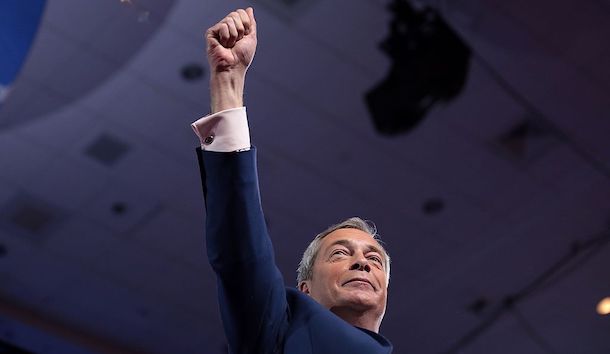The citizens of metroland like to think of themselves as dwelling in a global hub. They may regard London as a city-state, like Renaissance Venice, or as a company town whose HQ is Westminster. It has yet to reach the corporate consciousness that, as Coriolanus put it, “There is a world elsewhere,” beyond the boundaries of the Roman settlement of Londinium. That “world elsewhere” is now being redefined in provincial England, especially in the North.
Sedgefield stands symbol for that other England. It is in County Durham and was Tony Blair’s parliamentary constituency. It was a safe seat, having returned a Labour MP ever since 1935. When Blair stood down as Prime Minister in 2007, he at once sold his house in Sedgefield and has never gone back. The town lives on, and last Wednesday staged an event of note: a packed marquee on the racecourse, where people paid £5 each to see Nigel Farage speak for 15 minutes. He did not disappoint. Farage bounded on stage like a rock star—he has clearly learned from Donald Trump, with whom he is on good personal terms, how to work the crowds in these events. Again like Trump, he gets across a single message. The Remainers have striven over three years to frustrate the will of the people. “Tony Blair is the spiritual leader of Remain,” he said to wide applause. Blair did not leave a legacy loyalty in Sedgefield. Hence Farage’s conclusion: “We are now seeing a realignment of people’s political identity. People now associate with being Leavers or Remainers than being Labour or Conservative.” He is now hailed as the savior of England. His Brexit Party is the voice of those yearning to leave the European Union. And that voice is unquenchable.
The two leaders, Boris Johnson and Nigel Farage, have parties that could not be more different in nature, whatever their nominal convergence of aims. The Conservatives are, frankly, a rabble. Twenty-one MPs openly mutinied against the Government policy, for which the whip was taken away from them, and there are numerous covert Remainers. They have lent their backing to the grand remonstrance to thwart Brexit, and quite a few have a personal hatred for Boris. There is already strong support for an “olive branch” to be held out to the mutineers, which would of course emasculate the discipline to which they are subject. Others plead for a second referendum, which would destroy the authority of the first and only. To put it euphemistically, the “party,” which now merits inverted commas, is in disarray. A radical columnist on the Telegraph writes that the Conservative Party “is in an advanced state of decomposition.” Farage is lord of his party. He owns it. Each one of the 29 M.E.P.s who now sit on the upholstery of Brussels was vetted and passed by the leader, and anyone hoping for a Westminster future in the Brexit Party must show absolute fealty to the leader. There is no party organization to give the leader trouble, as there was with UKIP. The BP message comes out clear and strong, with no hint of ambiguity or reservation: Britain must leave the EU on October 31, with a clean break. In that event the Brexit Party will fully support the Conservatives in the coming general election. Failure to meet Farage’s bar will mean that his party will oppose the Conservatives in every constituency, and that would in all probability lead to a Corbyn government.
Anyone can see that a pact between the two parties is essential. But this prospect is at present denied by Farage and his chief henchman, Dominic Cummings, whose advice to a reporter was “get out of London.” That is exactly what Farage is doing. He has now embarked on a seven-night Conference tour. It is his Midlothian Campaign. Gladstone’s campaign finished Disraeli, and if Boris fails to get it right Farage will finish him.



Leave a Reply